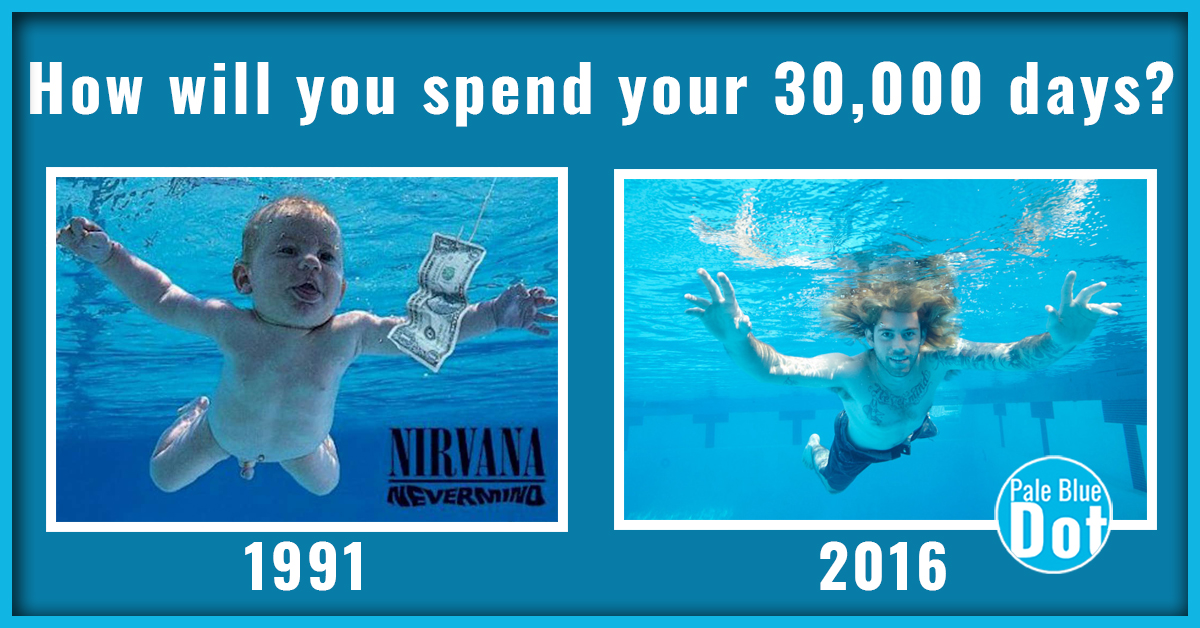Let’s do some math.
How many days do you have to live? If the average human being lives about 82 years, and you multiply that by 365 days in a year, you get 29,930 days. That’s not terribly lyrical. For the purposes of this post, we’re going to round it up slightly, to give us an easier number for discussion purposes: 30,000.
You have about thirty thousand days on this planet.
Let’s do some more math. Take your current age. Take 30,000 minus your age in years multiplied by 365. That’s the number of days you have left if you turn out to be absolutely average. Most people aren’t average. Even the dull ones. So, if I were you, I wouldn’t count on that number being exact. Do you want a visual? Click here for a spreadsheet.
Now we’re going to throw the math out the window. Please.
That was an estimate, not a guarantee.
30,000 days is not a promise. You might get more time. Some people live long lives. My grandmother is 99 years old now. That’s 6,135 more days than 30,000, and she’s still going strong. She lives independently in her own apartment, which is absolutely incredible for a woman only one year away from getting a centenary birthday card from the Queen. My mother, on the other hand, got about six thousand days less than the possible 30,000. Some people, like my step-sister and her husband, die even younger… there is no guarantee.
This weekend, I attended the memorial service for an uncle. When you’re standing there, surrounded by friends and family, it’s hard not to wonder what they will say about you, when your time comes. Will you have made good use of the time you were given? Will you be content with the efforts you have made, or will you have a list of things you wish you had done?
In The Top Five Regrets of the Dying, a palliative nurse by the name of Bronnie Ware recorded the most common regrets of the dying. Here they are:
I wish…
Want to hear more from Bonnie? Here are links to her Ted Talk. Her findings match up with what Michael and I have found in our own discussions with people facing death. They all wished they had spent more time on the things that really mattered to them, and had been less distracted with things that ultimately were not that important.
Let’s break this down some more.
Remember how earlier, I decided to round the number of days the average person lives up a little bit, so I could get to an easier number to remember? I’m going to do something like that now. Those five regrets all have one element in common: people regret the actions that they didn’t take.
You can’t change any of the days behind you, but you do have control over what you do today and what you do tomorrow.
Here’s the hard part: you need to spend less time planning things. No one is going to remember how hard you worked at planning to do the things you didn’t do. You are not going to look back on the plans you didn’t execute on your deathbed with satisfaction. You need to spend more time taking action. It doesn’t need to be perfect… just try to move in the direction you want. Even if you only move a little bit closer to your goal, it is measurable action that you can look back on later with satisfaction. If you only plan and never act, you are setting yourself up for regret.
Time flies. Let’s use an example from popular culture. Look up at the image at the top of this post. That’s the Nirvana baby. At this point, he has about 19,415 days left out of the 30,000 estimate. That album wasn’t terribly long ago… or at least, it doesn’t seem so to me. How many experiences has that man had by this point in his life? How many experiences remain ahead of him?
The Nirvana baby is about a year away from turning 30
— Elon Musk (@elonmusk) January 6, 2020
The fundamentally cheering fact I chose to focus on is that the days ahead of me offer me a lot of chances to change my story. 2020 is a leap year. I have 366 days to try to break away from the urge to keep planning and scheming about how I will make my life better. 366 days where I can take actions, even small ones. Each action puts me into motion, and the more often I take action towards my goal, the more progress I will make towards that goal. I don’t even have to be right all the time. Each time I act, there’s a chance I get closer to my goal. Even if it doesn’t work out as planned, at least I am in motion, and there is more of a chance that I will remain in motion. The longer I remain in motion, the fewer regrets I will have at the end of my life, whether it is tomorrow, or years later.
Conclusion
You have a finite number of days on this planet. No one can tell you for sure how many are left. When you get to the last day, you want to look back on your life, and have as few regrets as possible. The things that you are most likely to regret are the things you didn’t do. Therefore, starting today you are going to spend less time planning and more time doing the things that you want to do.
Cultivate a bias for positive action, and you will increase the odds of building a legacy that will bring you a sense of joy when you look back on your life.
So, what action will you take today?


Time passes so quickly. People have a tendency to plan until everything is perfect, and will not do anything (a vacation, for example) even if they are so close, say at 90% planned out. Instead, we should be more impulsive, and do that vacation even if it’s only partially planned. When we are younger, we seem to be more impulsive. I remember in my twenties my brother and I heading on a week’s vacation driving to the U.S. with no idea where we would be staying or eating. Now I tend to analyze destinations, hotels and places to eat, far more than I should.